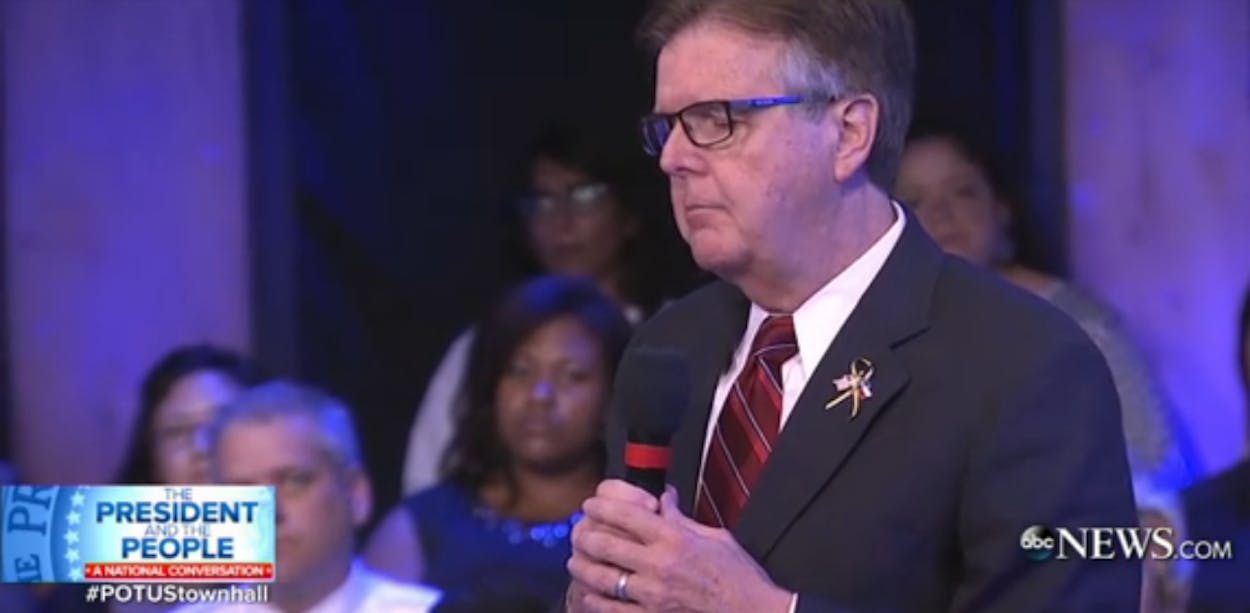Thursday night, ABC News broadcasted “President Obama and the People Town Hall: A National Conversation.” The event, which was hosted by David Muir, invited citizens from across the country to have “a national conversation about policing” and to ask the president their questions, with “no question off limits.” In attendance were police officers, families of victims of police brutality, and Texas Lieutenant Governor Dan Patrick.
When Patrick was given the chance to ask his question, he challenged Obama on his support of police officers:
First of all, Mr. President, as Lieutenant Governor of Texas, like you, I have some people that really like me some people that really don’t. But the police officers in Texas know without question, regardless of their political party, that they have my support and I have their back. I’m concerned that police officers across the country, they know you support law enforcement, of course. But do they really in their heart feel like you’re doing everything you can to protect their lives? Yesterday, you had meetings at the White House and afterwards you said that the tensions between police and between black Americans is only going to get worse. Words matter. Your words matter much more than mine. Everything you say matters and I would ask you to be careful, when there is an incident, of not being too quick to condemn the police without due process and until the facts are known. I know that’s not your intention, but again, words have meaning.
He also asked the president to turn blue lights on at the White House because it would “send a strong message” to police officers. It’s not clear what Patrick means by police officers “knowing in their heart” that Obama supports them (or how he even has the ability to gauge that), but he seems to believe that it means Obama should only speak in support of police officers and not discuss victims of police brutality or how racism has, does, and will continue to influence policing in the U.S.
Not only is it presumptive for a white man to try to tell a black man how and when to talk about racism, but it’s not an accurate understanding—as Obama pointed out—of Obama’s statements. “I have been unequivocal in condemning any rhetoric towards police officers,” Obama responded. “So, I think, lieutenant governor, you’d have to find any message that did not include a very strong support for law enforcement in all my utterances dating back to Ferguson.”
Even during the memorial service for the officers slain in Dallas, Obama expressed support for both law enforcement and victims of police brutality. Mourning both aren’t mutually exclusive, just as discussing police policy reform and safety are not opposing ideas. “I appreciate the sentiment,” Obama added. “I think it’s already been expressed. I’ll be happy to send it to you, in case you missed it.”
There’s also the irony of Patrick attempting to lecture Obama on how “words matter” after his own very recent comments about protesters in Dallas during the mass shooting. “All those protesters last night, they turned around and ran the other way expecting the men and women in blue to protect them,” Patrick told Fox News. “What hypocrites!”
He then went on to blame Black Lives Matter protestors for the actions of the sniper, Micah Johnson. His comments during that interview displayed a deep misunderstanding of what the Black Lives Matter campaign is about. Wanting an end to police violence is not a call for violence against police. That’s a dishonest connection to make. Patrick’s statements are even more striking compared to his restrained and limited comments about Sandra Bland, the Texas woman found hanged in a Waller County jail almost exactly a year ago.
As lieutenant governor of Texas, Patrick already has a larger platform than any of the families and activists affected by police brutality. The lives of police officers and black people matter equally, so if Patrick would use the opportunity to speak about the “heart” of police officers across the nation, he should also speak on behalf of those who have rallied around the deaths of Sandra Bland, Trayvon Martin, and Philando Castile. Patrick’s question to Obama could easily be flipped on him: how can black Texans know he supports them when he uses his platform to do such things as call them “hypocrites” for wanting to feel safe around police officers?
The town hall is already drawing criticism from some, most notably from Erica Garner—the daughter of Eric Garner, a New York man who was killed by NYPD in 2014. Garner walked out of the town hall in protest, claiming that ABC News had misled her on how they would prioritize her questions. Instead of allowing her to speak to the president on air, Garner claims that she wasn’t given an opportunity to ask Obama about the Department of Justice’s investigation into her father’s death until after the broadcast, after she’d walked off and shouted in protest. Garner, who took the time to attend while planning an event around the two year anniversary of her father’s death, said ABC News seated her family next to the families of two officers killed days after a grand jury chose not to indict the officer who’d choked Eric Garner.
As Obama stated, conversations like this are necessary to tackle America’s racial history and what that means for policing today. We can hope that maybe Dan Patrick, in choosing to attend the town hall, is beginning to understand that as well. Hopefully in the future, he’ll use his platform to address and begin to resolve the issues of both police brutality and police safety, because the two go hand-in-hand. As Patrick himself said, “words matter,” and as a representative of Texas—no matter how you feel about it—his certainly do.








